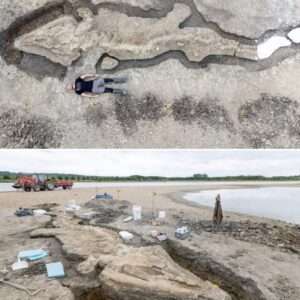Deep in the depths of Lake Mendota in Wisconsin, a remarkable archaeological find has left experts in awe: a trove of 11 ancient canoes dating back an astonishing 4,500 years. This groundbreaking discovery is highlighted by the unearthing of the oldest known canoe in the Great Lakes region, offering invaluable insights into the early civilizations that once thrived in Wisconsin.

The saga of exploration commenced in 2021 with the retrieval of a 1,200-year-old canoe, setting the stage for what would become an enthralling journey through time. Subsequent expeditions yielded a series of remarkable artifacts, culminating in the breathtaking unearthing of a 3,000-year-old canoe in 2022. However, the most breathtaking find emerged later—a canoe carved from elm, estimated to hail from around 2,500 BC, now acclaimed as the crown jewel of this remarkable collection.
These ancient vessels not only provide a window into the daily lives of the region’s early inhabitants millennia ago but also stand as testament to the ingenuity and craftsmanship of our forebears. Spearheading this momentous endeavor is Dr. Amy Rosebrough, State Archaeologist for the Wisconsin Historical Society, who underscores the pivotal role of these discoveries in weaving together the tapestry of the region’s history and illuminating the transformative environmental shifts that have unfolded over the ages.

As experts continue to delve into the mysteries encapsulated by these time-honored artifacts, each canoe serves as a gateway to a bygone era, inviting us to marvel at the resilience and resourcefulness of those who once navigated Wisconsin’s pristine waters. The unearthing of these ancient canoes not only enriches our understanding of the past but also underscores the enduring significance of preserving our cultural heritage for generations to come.





